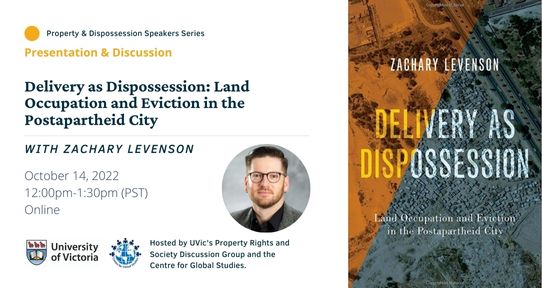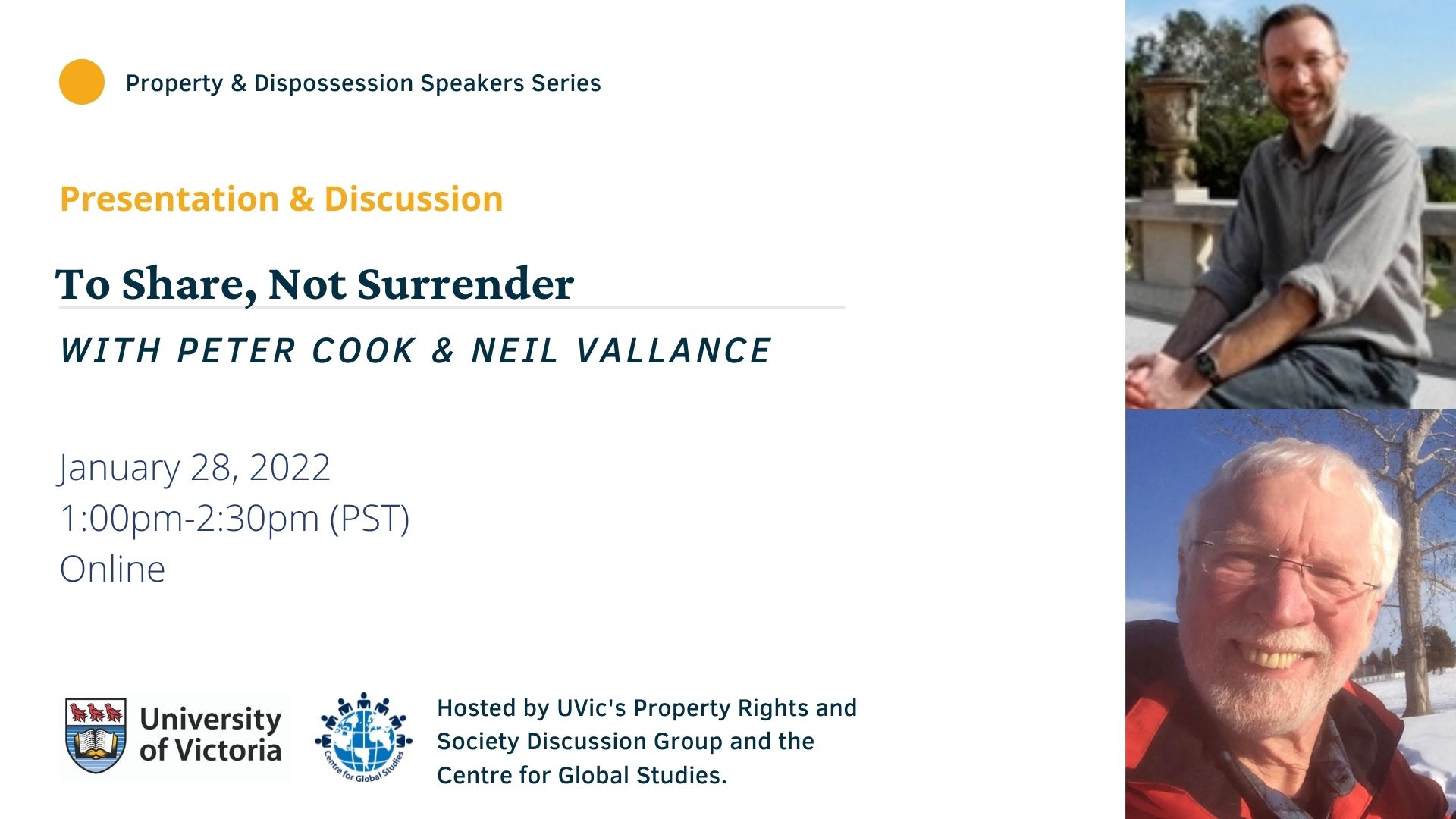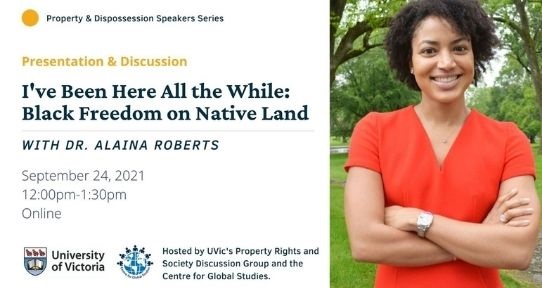Property Rights and Society Discussion Group
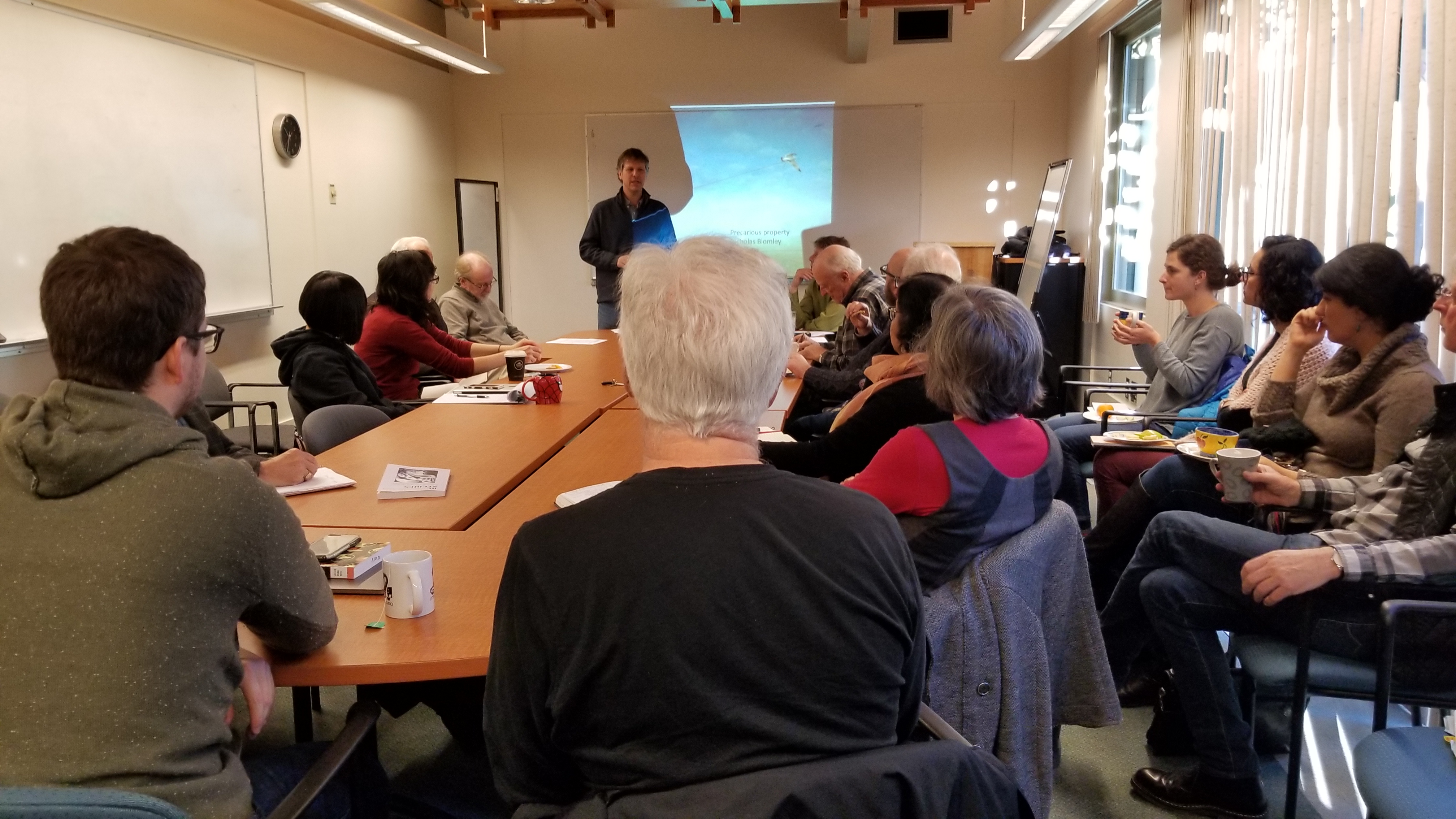
The Property Rights and Society Discussion Group comprises a group of interdisciplinary scholars with a mutual interest in the study of property in its many forms and the ways it impacts on and is expressed through society across cultures and jurisdictions at the global level. The group runs a series of work-in-progress papers involving scholars from UVic and beyond.
Contacts:
Martin Bunton
Program Committee Chair, Centre for Global Studies,
Professor, Department of History
mbunton@uvic.ca
Andrew Buck,
Associate Fellow, Centre for Global Studies,
Adjunct Professor, Faculty of Law and Department of History
andrewbuck@uvic.ca
Wealth, Land, and Property in Angola: A History of Dispossession, Slavery, and Inequality with Mariana P. Candido
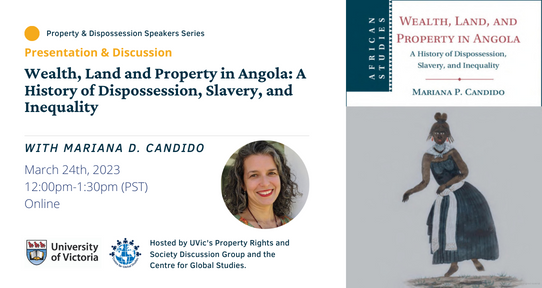
WHEN: March 24th, 2023
TIME: 12pm-1:30pm
WHERE: Online
DETAILS:
Exploring the multifaceted history of dispossession, consumption, and inequality in West Central Africa, Mariana P. Candido presents a revisionist history of Angola from the sixteenth century until the Berlin Conference of 1884–85. She demonstrates how ideas about dominion and land rights informed the appropriation and enslavement of free people and their labor. By centering the experiences of West Central Africans, and especially African women, this book challenges dominant historical narratives and shows that securing property was a gendered process. Drawing attention to how archives obscure African forms of knowledge and normalize conquest, Candido interrogates simplistic interpretations of ownership and pushes for the decolonization of African history.
Mariana P Candido is Associate Professor in the Department of History at Emory University. She is a specialist in West Central African history during the transatlantic slave trade. Her books include: Wealth, Land, and Property in Angola: A History of Dispossession, Slavery, and Inequality (Cambridge UP, 2022), An African Slaving Port and the Atlantic World: Benguela and its Hinterland (Cambridge UP, 2013) and the co-edited collections African Women in the Atlantic World. Property, Vulnerability and Mobility, 1680-1880 (2019) and Crossing Memories: Slavery and African Diaspora (2011). She is also one of the editors of African Economic History.
The Long Land War: The Global Struggle for Occupancy Rights with Jo Guldi
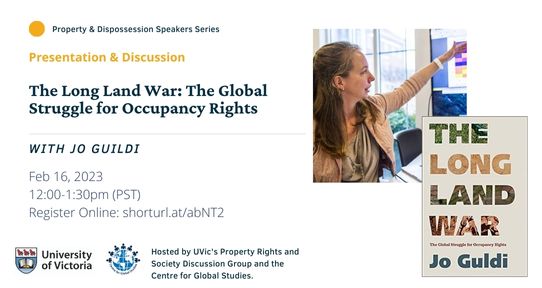
The Long Land War tells the story of a global struggle to bring food, water, and shelter to all. Land is shown to be a central motor of politics in the twentieth century: the basis of movements for giving reparations to formerly colonized people, protests to limit the rent paid by urban tenants, intellectual battles among development analysts, and the capture of land by squatters taking matters into their own hands. The book describes the results of state-engineered “land reform” policies beginning in Ireland in 1881 until U.S.-led interests and the World Bank effectively killed them off in 1974. In considering how we could make the earth livable for all, The Long Land War works out the important relationship between property ownership and justice on a changing planet.
Jo Guldi is Professor of History at Southern Methodist University, Dallas, Texas. She the author of The Long Land War (Yale UP, 2021), Roads to Power: Britain Invents the Infrastructure State (Harvard UP, 2012) and co-author (with David Armitage) of The History Manifesto (CUP, 2014). Her areas of interest include the history of Great Britain, the British Empire, landscape history, legal history, property law, infrastructure, longue-duree history, digital methods, international development, and agrarian studies.
Delivery as Dispossession: Land Occupation and Eviction in the Postapartheid City with Zachary Levenson
Delivery as Dispossession explains why nearly 30 years after the transition to democracy, the South African government continues to evict squatters from urban land. It argues that housing officials view occupiers as threats to the government’s housing delivery program, which, they insist, requires order and state control. New occupations are therefore stigmatized as “disorderly” threats, and government actors represent their removal as a precondition for access to housing. Drawing on a decade of sustained ethnographic fieldwork in two such occupations in Cape Town, this study explains why one was evicted, whereas the other was ultimately tolerated, answering a central question in urban studies: how do governments decide when to evict, and conversely, when to tolerate? These decisions are not made in a vacuum but instead require an analysis that expands what we typically call “the state.” This book argues that the state does not simply “see” occupations, as if they were a feature of the natural landscape. Rather, occupiers collectively project themselves to government actors, affecting how they are seen. But residents are not only seen; they also see, which shapes how they organize themselves. When residents see the state as an antagonist, they tend to unify under a single leadership; but when they see it as a potential ally, they often remain atomized as if they were individual customers. The unity in the former case projects an orderly population, less likely to be evicted; but the fragmentation in the latter case projects a disorderly mass, serving to legitimate eviction rulings.
Zachary Levenson is a Donald D. Harrington Faculty Fellow in Sociology at the University of Texas at Austin, an Assistant Professor of Sociology at the University of North Carolina at Greensboro, and a Senior Research Associate in Sociology at the University of Johannesburg. He is the author of Delivery as Dispossession: Land Occupation and Eviction in the Postapartheid City, released earlier this year on Oxford University Press. He is currently working on his next book, which considers the emergence of the concept of racial capitalism in South Africa and the United States. He is also editing a special issue of Ethnic and Racial Studies on South African theories of racial capitalism, which will be out next year. His work has appeared in the Journal of Agrarian Change, Du Bois Review, Qualitative Sociology, and Urban Studies, among many other venues.
A Legacy of Exploitation: Early Capitalism in the Red River Colony, 1763 – 1821 with Susan Dianne Brophy
A Legacy of Exploitation, I turn to Marxist thought and use a dialectical materialist framework to study dispossession. Although it lends itself to the analysis of history as constant motion, this approach also reveals the limitations of certain Marxist tenets when it comes to comprehending dispossession in the settler colonial context. On the occasion of this talk, I reflect on this modified Marxist framework. I maintain that the value of my dialectical materialist approach is that it reveals the extent to which transformations associated with the settlement at Red River were informed by reactions to Indigenous producers’ relative autonomy. As I elaborate on this point over the course of the book, I confront two assumptions: first, that the history of settler colonialism entails a conspicuous shift from violent dispossession to administrative containment, and second, that the history of settler colonialism begins with the dispossession of land. In challenging the first assumption, I question the basic version of the transition to capitalism thesis in Marxist thought; in challenging the second, I adopt a longer historical account of dispossession that is more attuned to Indigenous peoples’ agency. Taken together, they show a different way of thinking about dispossession in the Canadian settler colonial context.
Susan Dianne Brophy received her PhD in Social and Political Thought from York University (Canada) and is serving as Chair of the Department of Sociology and Legal Studies at St. Jerome’s University in the University of Waterloo (Canada). Her current research focuses on the theory and history of law and capitalism as well as anticolonialist methodology and analysis. In addition to her recent book, A Legacy of Exploitation: Early Capitalism in the Red River Colony, 1763-1821 (UBC Press), she has a forthcoming publication titled ‘Law and Transitions to Capitalism’ in Social & Legal Studies.
Native Removal Writing: Narratives of Peoplehood, Politics, and Law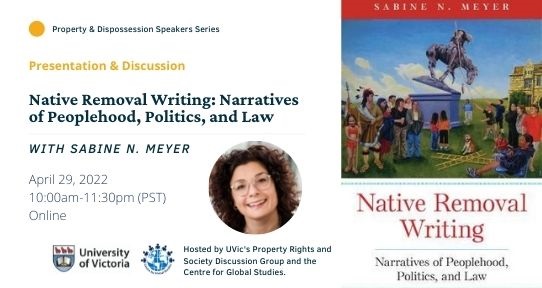
Indian Removal, the nineteenth-century policy of expelling Native peoples from their land, has generated a plethora of Native American writings that negotiate forms of belonging–the identities of Native collectives, their proprietary relationships, and their most intimate relations among one another. By analyzing these writings in light of domestic settler colonial, international, and tribal law, Sabine N. Meyer reveals their coherence as a distinct genre of Native literature that has played a significant role in negotiating Indigenous identity. Critically engaging with Native Removal Writings across the centuries, Meyer’s work shows how these texts need to be viewed as articulations of Native identity that respond to immediate political concerns that take up the question of how Native peoples can define and assert their own social, cultural, and legal-political forms of living, being, and belonging within the settler colonial order. Placing novels in conversation with nonfiction writings, Native Removal Writing ranges from texts produced in response to the legal and political struggle over Cherokee Removal in the late 1820s and 1830s, to works written by African-Native writers dealing with the freedman disenrollment crisis, to contemporary speculative fiction that links the appropriation of Native intangible property (culture) with the earlier dispossession of their real property (land). Native Removal Writing thus testifies to both the ongoing power of Native Removal writing and its significance as a critical practice of resistance.
Sabine N. Meyer is a Professor of American Studies and Co-director of the North American Studies Program at the University of Bonn. Her recent research has focused on Native American writing and law/politics from the nineteenth century onward, and on representations of Native Americans/Indigenous peoples in North American popular culture. Meyer is the author of We Are What We Drink: The Temperance Battle in Minnesota (U of Illinois P, 2015) and Native Removal Writing: Narratives of Peoplehood, Politics, and Law (U of Oklahoma P, 2022). Her publications also include scholarly articles in scholarly journals such as the American Indian Quarterly, Law & Literature, Eighteenth-Century Studies, and the Journal of American History. She is co-editor of the monograph series Routledge Research in Transnational Indigenous Perspectives.
Seeing Red: Indigenous Land, American Expansion, and the Political Economy of Plunder in North America
Against long odds, the Anishinaabeg resisted removal, retaining thousands of acres of their homeland in what is now Michigan, Wisconsin, and Minnesota. Their success rested partly on their roles as sellers of natural resources and buyers of trade goods, which made them key players in the political economy of plunder that drove white settlement and U.S. development in the Old Northwest. But, as Michael Witgen demonstrates, the credit for Native persistence rested with the Anishinaabeg themselves. Outnumbering white settlers well into the nineteenth century, they leveraged their political savvy to advance a dual citizenship that enabled mixed-race tribal members to lay claim to a place in U.S. civil society.
Michael Witgen is a professor in the Department of History and the Center for the Study of Ethnicity and Race at Columbia University, and he is a citizen of the Red Cliff Band of Lake Superior Ojibwe. His publications include “An Infinity of Nations: How the Native New World Shaped Early North America, (Philadelphia: University of Pennsylvania Press, 2012), and “American Indians in World History,” in the Oxford Handbook of American Indian History, ed., Fred Hoxie, (Cambridge: Oxford University Press, April 2016). His current research examines the intersection of race, national identity, and state making in the Old Northwest of the early republic, and includes the essay “Seeing Red: Race, Citizenship, and Indigeneity in the Old Northwest,” published in Journal of the Early Republic in 2018, and awarded the Ralph D. Gray prize for best original article by the Society for Historians of the Early American Republic. He is also the author of Seeing Red: Indigenous Land, American Expansion, and the Political Economy of Plunder in North Americawith the press of the Omohundro Institute for the Study of Early American History and Culture.
A False Tree of Liberty
In England, at the end of the eighteenth century, a heated controversy over the rights of man coincided with the final enclosure of common lands and the momentous changes associated with early industrialism. Tracking back still further to the sixteenth- and seventeenth-century writing about dispossession, resistance and rights, A False Tree of Liberty reveals a forgotten tradition of thought about central issues in human rights, with profound implications for their prospects in the world today.
Susan Marks is a Professor of International Law at the London School of Economics. She previously taught at the University of Cambridge and King’s College London. Her research seeks to bring insights from critical social theory to the study of international law and human rights. She is the author of The Riddle of All Constitutions, International Human Rights Lexicon (co-authored with Andrew Clapham) and A False Tree of Liberty, and edited International Law on the Left.
To Share, Not Surrender
To Share, Not Surrender appraises the historical and present-day relevance of treaty-making in the colonies of Vancouver Island and British Columbia. The authors take us back to when James Douglas and his family relocated to Fort Victoria on Vancouver Island in 1849, critically tracing the transition from treaty-making in the colony of Vancouver Island to reserve formation in the colony of British Columbia. The chapters demonstrate that the continuing inability to arrive at equitable land-sharing arrangements stem from a fundamental absence of will with respect to accommodating First Nations world views. To Share, Not Surrender is an attempt to understand why, and this to advance the urgent task of reconciliation in Canada.
Dr. Peter Cook is an Associate Professor in the Department of History at the University of Victoria. He hails from the Ottawa Valley, the traditional territory of a number of Algonquin nations. His research focuses on alliances and treaty making involving Indigenous groups in eastern North America between 1500 and 1850. His current project examines the background to an `1847 surrender of lands in upper Canada.
Neil Vallance was a lawyer in private practice in Victoria for many years. In 2016 he obtained a PhD from the Faculty of Law at the University of Victoria with a dissertation on the formation of the Vancouver Island (or “Douglas”) Treaties of 1850-1854. For the last twenty years he has researched and written ethno-historical reports on Vancouver Island Treaty Claims. He currently teaches a course on residential property law at the University of Victoria.
The Lawful Forest
This presentation provides an overview of the authors’ forthcoming book, The Lawful Forest: A Critical History of Property, Protest and Spatial Justice (Edinburgh University Press 2022), which surveys the legal geographies of the commons. Using the metaphor of the ‘lawful forest’ as both material place and metaphysical idea, the authors argue that hegemonic spatial orderings are neither pre-ordained nor inevitable, but the outcome of centuries of erasure and violence. Identifying ‘shadow revolutions’ from the Forest Charter of 1217 to the ecological communes of the 1970s, and more, this presentation explores how a critical history of space and place reveals recurring ‘continuities’ that disrupt enclosure’s linear narrative, and depict a relational, communitarian understanding of property that is both ancient in its provenance, yet prefigurative of future spatial choices.
Dr. Cristy Clark is a senior lecturer with the University of Canberra Law School, Australia. Her research focuses on legal geography, the commons, and the intersection of human rights, neoliberalism, activism and the environment.
Dr. John Page is a professor of law at Southern Cross University, Australia. His research explores the diversity of property in the common law tradition, and how property intersects with public space, the materiality of place, and the propertied design of lived landscapes.
The Laws and the Land: The Settler Colonial Invasion of Kahnawà:ke in Nineteenth-Century Canada
As the settler state of Canada expanded into Indigenous lands, settlers dispossessed Indigenous people and undermined their sovereignty as nations. One site of invasion was Kahnawà:ke, a Kanien’kehá:ka community and part of the Rotinonhsiónni confederacy. In The Laws and the Land, Daniel Rück delineates the intersection of the establishment of a settler colonial relationship from early contact ways of sharing land; land practices under Kahnawà:ke law; the establishment of modern Kahnawà:ke in the context of French imperial claims; intensifying colonial invasions under British rule; and ultimately the Canadian invasion in the guise of the Indian Act, private property, and coercive pressure to assimilate. It is one story of the "slow violence" of Canada’s legal and environmental conquest of Indigenous peoples and lands, and the persistence of one Indigenous nation in the face of the onslaught. Understanding this story involves issues of human relations with environments, communal and individual ways of relating to land, legal pluralism, historical racism and inequality, and Indigenous resurgence.
Daniel Rück is Assistant Professor in the Department of History and the Institute of Indigenous Research and Studies at the University of Ottawa. He is a settler scholar living and working on the unceded territory of the Algonquin nation along the Kitchissippi (Ottawa River).
“I've Been Here All the While: Black Freedom on Native Land” with Dr. Alaina Roberts
In nineteenth-century Indian Territory (modern-day Oklahoma), a story unfolds that ties African American and Native American history tightly together, revealing a western theatre of Civil War and Reconstruction, in which Cherokee, Choctaw, Chickasaw, Creek, and Seminole Indians, their Black slaves, and African Americans and whites from the eastern United States fought military and rhetorical battles to lay claim to land that had been taken from others. As Black, white, and Native people constructed ideas of race, belonging, and national identity, this part of the West became, for a short time, the last place where Black people could escape Jim Crow, finding land and exercising political rights, until Oklahoma Statehood in 1907.
Dr. Alaina Roberts is an Assistant Professor of History at the University of Pittsburgh. Dr. Roberts’ research focuses on the intersection of African American and Native American history from the nineteenth century to the modern day with particular attention to identity, settler colonialism, and anti-Blackness. She is the author of I've Been Here All the While: Black Freedom on Native Land (University of Pennsylvania Press, 2021).
"Enclosure, Dispossession, and the Nineteenth-Century British Novel", with Dr. Carolyn Lesjak
In this talk, Dr. Lesjak presented an overview of her new book, The Afterlife of Enclosure: British Realism, Character, and the Commons, with a particular focus on the ways in which nineteenth-century British writers grappled with the profound transformations wrought by enclosure and the forms of dispossession it entailed. The presentation focused on the ties between enclosure and private property, fears of overpopulation, and the management of the poor and the persistence of the commons in the face of these assaults against it, both historically and in British realist novels of the nineteenth century. It highlighted both the longue durée of resistance to enclosure and the processes of “accumulation by dispossession” that link the old enclosures and the new enclosures today.
Dr. Carolyn Lesjak is Associate Professor and Chair of the Department of English, Simon Fraser University. She specializes in nineteenth-century British literature and culture, Marxist and feminist theory, and theories of the novel. She is the author of Working Fictions: A Genealogy of the Victorian Novel (Duke UP) and, most recently, The Afterlife of Enclosure: British Realism, Character, and the Commons (Stanford UP, 2021).
"The Unjust & Uncertain Tenure of Property in Persons: Slavery and Dispossession”, with Dr. Laura Brace
In this talk, Dr. Brace focused on the pamphlets of the antislavery debates in the 1790s. Antislavery writers argued that the West India planters were receivers of stolen goods, persevering in what they knew to be wrong, and dispossessing the enslaved of their fundamental property in their persons. The planters emerge as abettors and accomplices in iniquity and oppression. This presentation focused on their response, the arguments of the planters and their allies in defence of their property. What were they trying to hold on to in the face of these abolitionist arguments? The presentation explored some of the layers of dispossession at the heart of slavery as a ‘species of property’ that was regarded as valuable but precarious. What did it mean to own a property in other people, and what did the riskiness and uncertainty of that ownership mean for the property rights of the planters? As their right to property in their slaves came under attack from antislavery writers and campaigners, how did they try to shore up their ownership and mount a defence against their own dispossession?
Dr. Laura Brace is Associate Professor, Department of Politics and International Relations, University of Leicester, UK. Her research agenda focuses on the politics of property, and in particular the connections between self-ownership, gender, race and empire. She is the author of The Politics of Slavery (Edinburgh UP, 2018), The Politics of Property (Edinburgh UP, 2004) and The Idea of Property in seventeenth-century England (Manchester UP, 1998).
"Lineages of Dispossession: Palestinian Land Loss across Time and Geography”, with Dr. Gary Fields
This talk situated the modern-day dispossession of Palestinians within a longer historical time frame and across a broader geographical reach of land seizure initiated by actor groups with territorial ambitions. Using case study material from the English Enclosures, the Anglo-American colonial frontier, and modern Palestine, the talk proposed – tentatively – a model for deployment in the study of other cases of land seizure and dispossession.
Dr. Gary Fields is a Professor in the Department of Communication and an affiliate of the Department of History at the University of California, San Diego and is the author of ‘Enclosure: Palestinian Landscapes in a Historical Mirror’ (University of California Press, 2017).

